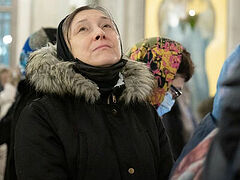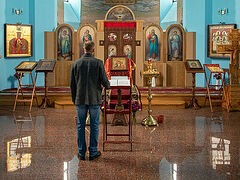Kostik [a diminutive and affectionate form of the name Konstantin.—Trans.] showed up in the church where Fr. Anatoly serves about five years ago. But then no one knew that he was Kostik. He looked unattractive—he had a chapped, swollen face with a broken nose and wore dirty and haphazardly chosen clothes, which had obviously once belonged to someone else. And there was a smell of alcohol from him... He looked like a typical homeless man.
Fr. Anatoly then felt annoyed. “Well, now he's definitely going to start telling us the same old tearful story that he has been robbed and will beg for money for bread / food / a ticket home,” Fr. Anatoly thought to himself. “And then he will squander it on drink. How many drunkards like him have been here before...” But Kostik did not ask for anything. He prayed a little and left. Then he came again… and disappeared. Nobody remembered him. There is no end to such vagabonds; maybe he went elsewhere looking for booze?
It was in winter. The Feast of the Baptism of the Lord was appoaching. Fr. Anatoly and his parishioners went to the surrounding villages to greet the locals, and Batiushka blessed their houses. After visiting some households, they suddenly saw that same man coming out of an old, lopsided house:
“Excuse me, Batiushka! May I have you for a minute?”
“You probably want me to bless your house, right?”
“Yes. But I have nothing with which to repay your kindness.”
“No need to repay.”
Fr. Anatoly went inside Kostik’s house. Poverty and desolation reigned in it. It smelled of cheap alcohol. The only furniture was an old bed, along with some antediluvian table with piles of old junk on it. The walls were crumbling, and the chilly wind was whistling through the cracks. And he had an earthen floor to boot.
“I went into another room and found that there was nothing at all in it. It was like a cave. There were only some old icons in the corner, along with a few notebooks on the floor,” Fr. Anatoly recalled.
“I pray here,” Kostik said quietly.
And he showed the priest the notebooks, in which there were the morning and evening prayers, written in his own handwriting.
“I was amazed,” Fr. Anatoly told me. “He looked like a degraded person, living in terrible conditions, but he didn’t forget God. And not only did he remember God—he had also copied out prayers by hand... We who live prosperous lives should continuously thank the Lord for providing us with everything we need, but we don’t always do it. But this man...”
Fr. Anatoly left, but Kostik stayed in his memory. Then the priest became overwhelmed by the many chores of life... He wanted to visit Kostik again, but somehow it didn’t work out, because he had so many things to do in his church and family. Eventually he went there a couple of times, but did not find Kostik. All he could do was sigh about him in prayer...
Spring set in, followed by summer; then autumn flew by, and winter came again... On the feast of St. Nicholas the Wonderworker (December 19) Batiushka made another round of the neighboring settlements, distributing gifts among locals.
“Let’s turn here,” he said to his companions at some point. He stopped near Kostik's house, looked and found that there were no panes in the windows. The window openings had been plastered over. In one place the plaster was even falling off. And it was winter outside.
“Well, I thought he was dead,” Fr. Anatoly related. “But just in case I shouted into the hole: ‘Kostik! Kostik!’”
“Batiushka, is that you? I’m so glad!”
Kostik's shaggy head appeared from the hole.
“He hadn’t seen me for almost a year, but he immediately recognized me just from my voice. Can you imagine that?” Fr. Anatoly marveled.
Fr. Anatoly greeted him with the feast, gave him treats and continued his journey.
“I was later told that he had distributed the sweets among the neighbor children. By the way, his neighbors loved him and fed him...”
Kostik had a brick stove in his home. Fr. Anatoly noticed that there was no iron cooking top on it. And without it you couldn’t cook food or get warm.
“Where is it?” Batiushka asked Kostik.
“I desperately wanted to drink some more alcohol and sold it to a scrap metal collector, but asked him not to resell it—I’ll buy it back somehow.”
“It’s so cold outside.”
“Never mind! It’s still around zero. I'll have time to do it. I only heat my house in sub-zero temperatures. I collect branches for this...”
Batiushka confessed to me that he even liked such honesty: “I desperately wanted a drink.”
“He didn’t lie or dissemble—he told me the truth.”
And Fr. Anatoly decided to buy the cooking top back from the metal scrap collector for Kostik. He went to him, but did not find him. “Okay, I'll come again,” he thought. While driving, he met his acquaintance in the area.
“Father, they say that you are now friends with Koschei,1 right?”
“With whom?” Fr. Anatoly was surprised.
“With Kostik who lives in an old shack. Do you know who he is?”
Many years earlier Kostik was a bandit, a gang leader in the area. He was involved in robberies, drug dealing, racketeering... Among those whom he and his gang had robbed was the father of the man Fr. Anatoly met along the way. Among other things, Kostik had stolen his old icon.
“No one was caught, but people knew for sure that it was him,” the man said. “And then Kostik returned the icon, quietly hanging it on a tree in front of the house. But someone saw him.”
Fr. Anatoly didn’t know anything about this. And he was even more surprised:
“A bandit... A robber... An icon...”
The next Sunday, Kostik came to Fr. Anatoly’s church. He inquired about confession and Communion, and the priest explained everything to him. And Kostik came up to the analogion. He confessed his sins for a long time, sincerely. He repented of everything he had committed throughout his life.
He did not conceal anything and did not justify himself in any way.
“But on that day I didn’t bless him to take Communion,” Fr. Anatoly went on. “There were serious reasons for that. We agreed that a week later he would come to confession again and then take Communion.”
Kostik dressed for Communion as if for a festive occasion. All those present in the church froze in surprise when they saw him.
“True, he wasn’t dressed according to the latest fashion. But he had acquired a velour jacket, clean plants, and a shirt somewhere, and combed his hair. It was evident that this was one of the most important events in his life.”
After the service Fr. Anatoly drove him to his home.
“I did a lot of harm to people,” Kostik told him. “That’s why I live like this now. This is as it should be—you have to pay for everything you have done. And the Lord is merciful. I inherited my parents’ house. At least there is a roof over my head. And I lost everything that I had gained dishonestly. God justly took it from me. He could have taken the house as well (and it would have served me right), but He had mercy on me.”
As Fr. Anatoly listened to him, he felt with all his heart that it was a real miracle of God. A miracle of true Christian humility.
“He was speaking very simply, without affectation, without tearing his clothes, and most importantly, with gratitude. Gratitude just for the fact that he was alive, that he had at least something to eat, that he had a place to lay his head, and for the fact that the Lord had torn him away from his bandit life. He had himself gotten hooked on drugs and ended up on the margins of society. His former fellow-mobsters had abandoned him, and others had turned away. But he accepted it and was grateful. Christ had probably knocked at his heart before then. After all, he returned the icon to that man.”
Kostik took Communion on Sunday. On Monday the priest and his friend bought his cooking top back from the scrap metal collector. They were going to bring it to him the next day because he was freezing. But Fr. Anatoly got a phone call:
“Kostik is dead. No one can say for certain what from. Maybe he died from exposure to the cold, or something else.”
The priest was silent. He was literally speechless. And he wept. He hadn’t had time to bring him the cooking top. His heart sank.
“Sometimes you read the lives of the saints and get astonished by their meekness, humility and gentleness. You think, it’s a miracle. ‘If only I could squint at such a person out of the corner of my eye’. He was a ‘publican’, a robber… But he saw Christ—and everything in him was transformed... But here is a miracle, right near me—Kostik-Koschei. When I remember him I understand that the Gospel is not something that was long ago. It is here and now. Before my very eyes a thief has entered Paradise. He humbled himself, repented, took Communion and, cleansed, departed to God.”
[I] receive the due reward of [my] deeds… Lord, remember me when Thou comest into Thy Kingdom...Verily I say unto thee, Today shalt thou be with Me in Paradise (Lk. 23:41-43).
From the book: A Parishioner’s Notes
The Sretensky Monastery’s Publishing House, 2022









